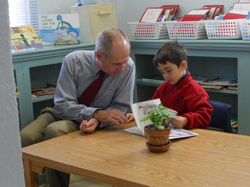
I could be a straight “A” student,
Quite serious and prudent,
High marks would I attain.
Not a class would I be bored in,
Wouldn’t go to Kenneth Gordon,
If I only had a brain!
So, faced with this negative sense of self, our goal for each student has to be to unlock the puzzle that has resulted in them developing this view of themselves and their prospects. We need to strive to help them to find their own individual pathway to success. So, having said that, the critical first step, is get them to believe that they can learn, they can thrive in a school environment, and that they do have as good a shot at success as anyone.
But how do you make that happen? Where should you look for the formula to kick-start the path to student success? Well there is lots of research (and even more opinion) to consult. You can look at Carol Dweck and decide that you need to move them from a fixed to a growth mindset, you can study Paul Tough and decide that what they lack is “grit”, you can read Carol Anne Tomlinson and immerse yourself in differentiation. You can built your programme, as we have, on a Universal Design model, or on neuroplasticity, or even make it feel like a boot camp. All of those practices, theories and models work for some kids. But none of them have a chance, unless you break down the basic barrier to student success, their own self-image!
Many schools have a pretty proactive Social Emotional Learning curriculum for their students, and across the North Shore we have great teams of counselors, psychologists, SLPs and OTs. Lots of wonderful resources for kids, but in spite of all that, it seems to me that our real source of insight in how to build confidence in students is not necessarily the experts, but someone a little closer to home.
Let me tell you what I mean. In the 1980s I taught at the University of Connecticut alongside William Purkey. Purkey is considered the father of the "inviting schools" movement and was the author of two books from the early 70s entitled Self-Concept and School Achievement and Inviting School Success. Bill Purkey always said that “anything worth doing is worth doing badly” (as anyone who has heard me sing will attest!) But he also emphasized the importance of school being a welcoming environment, where each child felt cared for and valued. School, he argued should be their home away from home, and a safe place to take risks. We have known this for decades, but is that always the case in our schools?
Standard school jargon talks about the principle of “in loco parentis”, educators acting in the place of the parent – we use it in classroom management, on field trips, and even in how we approach discipline. But maybe we’ve got it all wrong.
Maybe, if we educators really believed in the importance of in loco parentis, we could consider following a different kind of approach when working with our students. In fact, what if we acted like parents rather than teachers? What difference would that make to help students to succeed?
What if every school treated each child as if her or his success was critically important to us?
What if we all actively searched for ways in which every student could learn effectively?
What if our first response was always to believe what a child says and not try to pick apart their stories?
What if we all respected the fact that family life is complex, and that not every night at home is going to be conducive for completing homework?
What if we all stopped playing children off of one another with stars and stickers and class rankings and pep rallies – with our all too common practice of proclaiming winners and losers?
What if all educators acted the way that we expect our students' parents to act: to be supportive and to communicate regularly; to check agendas and sign homework; to encourage, to give second (and third and fourth) chances; to treat children with dignity and respect; and, to assess their work as an instructional tool - not as a judgment of individual worth?
You see, in loco parentis is not actually a legal construct at all, it is a philosophy of teaching and learning. The more that schools and administrators and teachers become cheerleaders, coaches and advocates for children; rather than taking on the roles of judge, jury and executioner; the better the chance they have for success.
We don’t ask parents to act like schools. And, for their part, schools should not take on the role of parents, but rather what we must do, as educators, is to embrace each parent's belief in the potential of her or his individual child. That is the true meaning of “in loco parentis”, and the ultimate secret for student success.


 RSS Feed
RSS Feed
